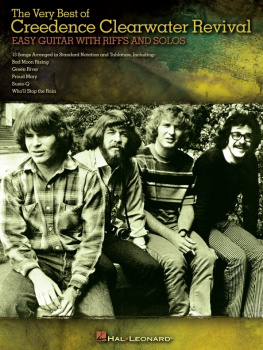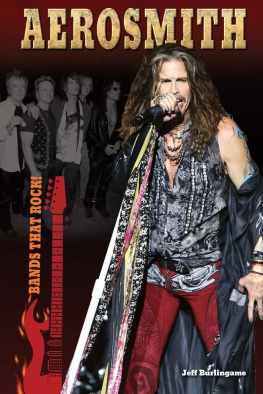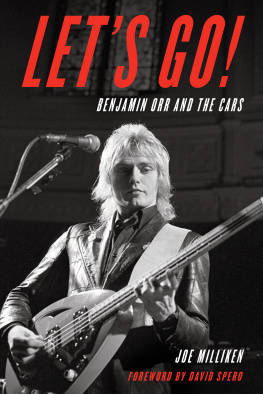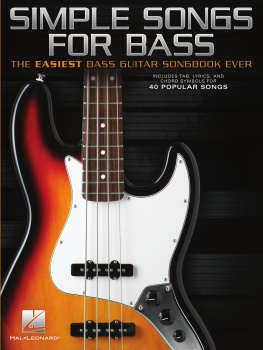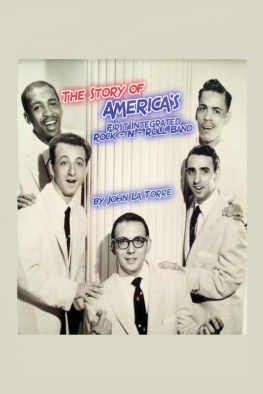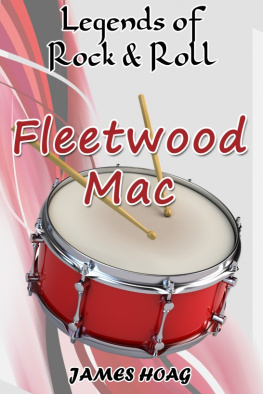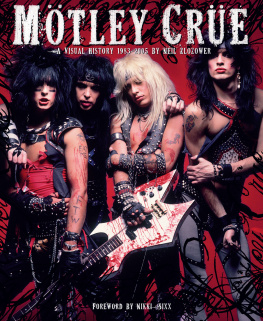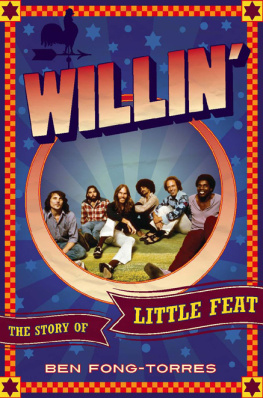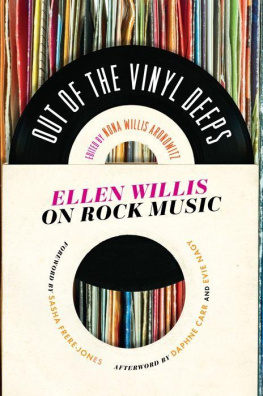BAD MOON RISING
BAD MOON RISING
UPDATED EDITION
THE UNAUTHORIZED HISTORY OF
CREEDENCE
CLEARWATER
REVIVAL
HANK BORDOWITZ

Cover design: Scott Rattray
Cover photograph by Jim Marshall
Copyright 1998 by Hank Bordowitz
Updated material (chapters 3640, discography, notes, and
bibliography) copyright 2007 by Hank Bordowitz
All rights reserved
Published by Chicago Review Press, Incorporated
814 North Franklin Street
Chicago, Illinois 60610
ISBN-13: 978-1-55652-661-9
ISBN-10: 1-55652-661-X
Printed in the United States of America
5 4 3 2 1
This book is dedicated to
My wife, Caren, and my boys, Michael, Larry, and Bill.
It aint easy putting up with an author around the house.
To my Mom, Dad, and Beth and Richard
And to my grandmother, Goldie Weiss,
who believed early and never stopped.
CONTENTS
ACKNOWLEDGMENTS
The author acknowledges
The estate of Ralph J. Gleason for the use of material from the Rolling Stone Interview With John Fogerty from Rolling Stone, February 21, 1970, and Inside the Blue Ridge Rangers, Rolling Stone, July 5, 1973, both works The estate of Ralph J. Gleason, used by permission of Jazz Casual Productions and the Gleason Family
Straight Arrow Publishers, Inc/Rolling Stone magazine for the use of The 100 Best Singles of the Last Twenty-five Years from Rolling Stone, September 8, 1988; Will Creedence Clearwater ever be revived? by Michael Goldberg from Rolling Stone, September 2, 1982
DISCoveries magazine for the use of A Revival Interview with Fortunate Son Doug Clifford, DISCoveries, November 1988, by Wayne Bryman, and Creedence Clearwater Revival, DISCoveries, November 1988, by Jerry Orbourne (for subscription information, call 1-800-829-9132)
Steve Wynn for permission to reprint his liner notes from John Fogerty Wrote a Song for Everyone
John Hubner for permission to use The Demon Fighter of Rock and Roll, West, 1986
Pam Bendich for the use of CCR covers and press material
Scott Isler for permission to use material from John Fogertys Triumph Over Evil, Musician, March 1995
Trish Fogerty for permission to use Toms letters and other information
Barbara Carr and Jon Landau for permission to use Bruce Springsteens speech at the rock and Roll Hall of Fame induction, 1993
The author wishes to thank
Richard Carlin, an editor and a gentleman
Fran Liebowitz and Jason Weinstein, from Writers House, agents extraordinaire
Jeff Jacobson, my legal guardian
Teri Hinte, High Priestess of Publicity at Fantasy
Bob Merlis, Pope of Publicity, and his disciples at Warners Publicity
All of the critical journalists upon whose shoulders I stand
Javier Diaz, Graham Niven, Robert Aerts, Rich (Reechie) Firestone, Bengt-Ake, Lisa Taylor, Lars Petersson, Michael Bernander, Phillip Brady, Alex Aberbom (of Blue Meanie Records [are you bluish? Funny you dont look bluish]), Matt Lowen, Joe Hannigan, Dana Doaks, Dave Joens, Steve Rosen, Jeff Hickman, and Eric Schumacher-Rasmussen
Ned Garrett, my legman in the Bay Area and a man with superlative research skills
Paul Garfunkle of Blackbird Records ( www.black-bird.com ), a discological scholar
Gary Jackson, Stephanie Hanus, Adam Bryant, John Robinson, and the rest of the gang at the River Rising mailing list
All my cybored friends on the Velvet Rope, specially Julie, Joe, Lynne and Kevin Carney
Peter Koers, head of the CCR Fan Club
Lonnie Gause, Laurie Dawson and the rest of the gang at GPI
Mac Randall, Bob Doerschuck, and the rest of the gang at Musician
Holly George-Warren, Joe Van Plummer, and Peter Kevis at Rolling Stone Press
Bob Olson at Warner Publishing
Ken Levy, Steve Goldmintz, Gary Graff, Danny Lipman at Rock Around the World, Bob George at the Archive of Contemporary music, Dave Sprague, Ida Langsam
Malcolm Burnstein
Al Bendich
Jeff Fogerty, Bob Fogerty, Jake Rohrer, Merl Saunders, Gail Fogerty, Russ Gary, Doug & Laurie Clifford, Stu Cook
Carey Baker, of the long, industrial memory
Ron, Andre, and Ben at Renaissance for keeping the knife sharp and the hammer pounding
The research staffs at the Lincoln Center Library, the 42d Street Library, the Suffern Free Public Library, and the Ridgewood (New Jersey) Public Library and the people who run all the Internet search services
Lon Marcus and Kathy Hoy for all the empanadas
And especially to Harold Bordowitz, who has great musical taste and did even when we were kids
INTRODUCTION
The Saddest Story in Rock and Roll
Fame and lasting quality dont often go hand in hand during the last half of the twentieth century. When people throw away broken computers and televisions, why should entertainers, performers, and other pop stars be any less disposable? The artists that top the charts one year often never get heard of again. Those who doby means of gifted artistry, determined craft, or even manipulation of the media that make them starsdeserve to be called legends.
During the five years that John Fogerty, his brother Tom, and his schoolmates Stu Cook and Doug Clifford made music as Creedence Clearwater Revival, they created a legacy that bands with double and triple that life span might envy. Artists as diverse as Elvis Presley, Bill Wyman, the Gun Club, Emmy Lou Harris, Def Leppard, Bill Haley, Bob Seger, and the Queen Ida Zydeco Band, to mention just a few, have covered CCR songs. By remaining true to the roots of rock, by expressing their joy in the blues and early rock and roll, the members of CCR inspired a new breed of rock, far from the trippy, psychedelic sounds that surrounded them when they played during San Franciscos Summer of Love.
CCR created a driving, rootsy, working-class sound, a spirit artists like Bruce Springsteen (who sometimes plays the groups Traveling Band as an encore) and Tom Petty inherited a decade later. When Buddy Seigal accused George Thorogood of sounding like CCR in interview in the LA Times, Thorogood responded, John Fogerty is an idol of mine. If I ever had to say, This is the style Id like to be, it probably would be John Fogertys. He writes the greatest songs in the world. Creedence played good, fun rock n roll.
Despite their short time in the spotlight, Creedence Clearwater Revivals music remains a staple on the radio. Better than a quarter century after it was first popular, long after many of their contemporaries fell into the abyss of obscurity, their songs and sound still ring in the public consciousness. They remain nearly as popular as they were when they first burst onto the music scene, even though the man who wrote, sang, and played guitar on all of the tracks refused to perform these songs live for nearly two decades.
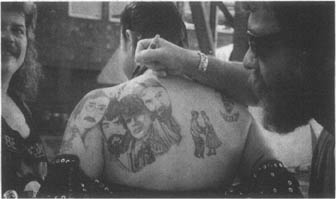
Courtesy Laurie Clifford Archives
A European fan gets his Creedence Clearwater Revival tattoo autographed.
Like Elvis or the Beatles, Creedence Clearwater Revival made such powerful music that no fewer than eight of their twenty singles had both sides hit the charts. In their time, they appealed to both hippies and rednecks. During the late 60s and throughout the 70s, their songs were as popular on truck stop jukeboxes as they were in college dorm rooms, and were played on AM top forty radio and the newly emerging FM album-oriented progressive stations. Creedence saw the world as their audience. They wanted to appeal to everyone. Literally everyone, John Fogerty said early on. And thats why its hard, because Im not trying to polarize hippies against their parents, or youth against just the people who are in their twenties. I think music, my concept of what music is supposed to be, shouldnt do that. It should unite, as corny as that is. You know everyone should be able to sit and tap their foot, or say, Wow! Thats the right thing!
Next page

